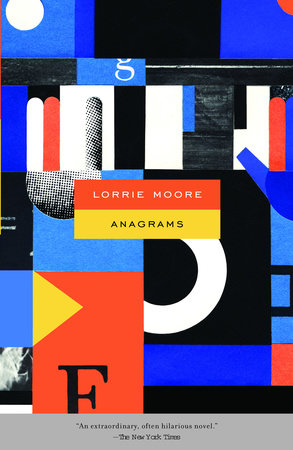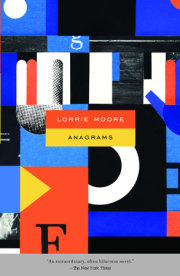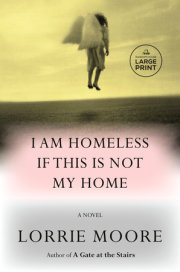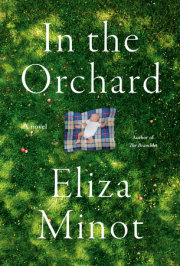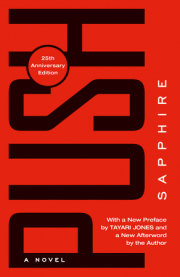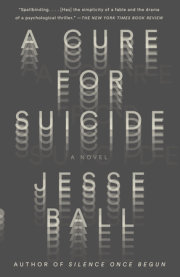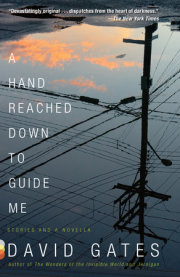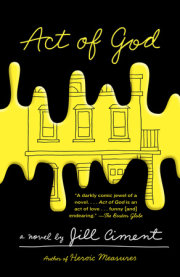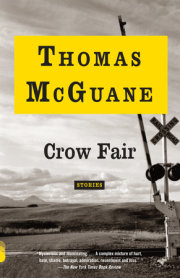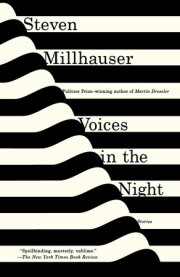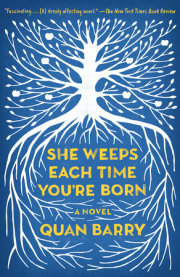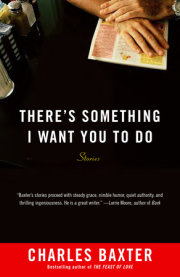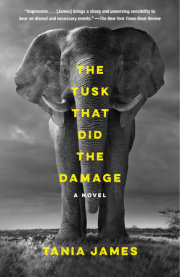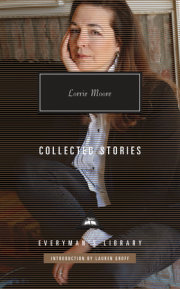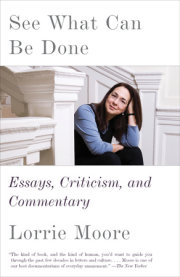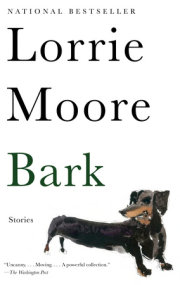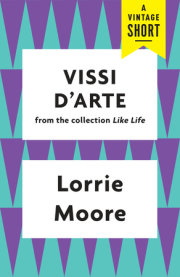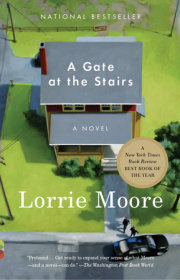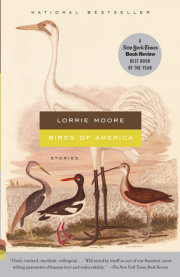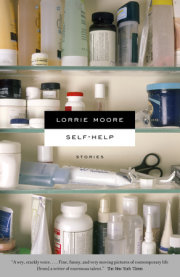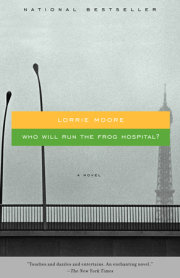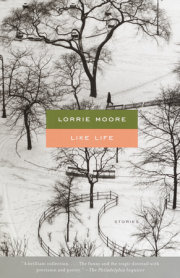1ESCAPE FROM THE INVASIONOF THE LOVE-KILLERSGERARD MAINES LIVED ACROSS THE HALL from a woman named Benna, who four minutes into any conversation always managed to say the word penis. He was not a prude, but, nonetheless, it made him wince. He worked with children all day, taught a kind of aerobics to pre-schoolers, and the most extreme language he was likely to hear seemed to him to be in code, in acronyms, or maybe even in German--boo-boo, finky, peenick--words that were difficult to figure out even in context, and words, therefore, from which he felt quite safe. He suspected it was not unlike people he knew who hated operas in translation. "Believe me," they would explain, "you just don't want to know what they're saying."Today they were talking about families."Fathers and sons," she said, "they're like governments: always having sword fights with their penises.""Really," said Gerard, sitting at her kitchen table, gulping at near-beer for breakfast. He palmed his beard like a man trying to decide."But what do I know." She smiled and shrugged. "I grew up in a trailer. It's not like a real family with a house." This was her excuse for everything, her own self-deprecating refrain; she'd grown up in a trailer in upstate New York and was therefore unqualified to pronounce on any of the subjects she continued to pronounce on.Gerard had his own line of self-excuse: "I was a retard in my father's play.""A retard in your father's play?""Yes," he said, realizing that faced with the large questions of life and not finding large answers, one must then settle for makeshift, little answers, just as on any given day a person must at least eat something, even if it was not marvelous and huge. "He wrote plays in our town. Then he did the casting and directing. It was harder to venture out through the rest of life after that.""How awful for you," said Benna, pouring more near-beer into both their glasses."Yes," he said. He loved her very much.Benna was a nightclub singer. Four nights a week she put on a black mini-dress and what she wearily called her Joan-Crawford-catch-me-have-me shoes, and went off to sing at the various cocktail lounges around Fitchville. Sometimes Gerard would go see her and drink too much. In the spotlight up front she seemed to him hopelessly beautiful, a star, her glass jewelry launching quasars into the audience, her laughter rumbling into the mike. He'd watch other men fall in love with her; he knew the fatuous gaze, the free drinks sent over between songs--he'd done that himself. Sometimes he would stay for all three sets and buy her a hamburger afterward or just give her a ride home. Other times, when it was crowded, he would leave her to her fans--the businessmen with loosened neckties, the local teenage girls who idolized her, the very musicians she hired to play with her--and would go home and sit in his bathroom, in his bone-dry tub, with his clothes on, waiting. The way their apartments were laid out, their bathrooms shared a wall, and Gerard could sit in his own tub and await her two-in-the-morning return, hear her enter her bathroom, hear her pee, hear the ruckle of the toilet-paper roll, the metal-sprung flush, the sliding shower door, the squirt, spray, hiss of the water. Sometimes he would call to her through the tiles. She would turn off the shower and yell, "Gerard, are you talking to me?""Yes, I'm talking to you. No. I'm talking to Zero Mostel.""Listen, I'm tired. I'm going to bed."Once she came home at three in the morning, completely drunk, and knocked on his door. When he opened it, she was slumped against the frame, eyes closed, shoes in hand. "Gerard," she drawled, thrusting her shoes at him, "will you make love to me?" and then she sank to the floor and passed out.Every morning she downed a whole six-pack of near-beer. "You know, I'm a widow," she said, and then told him quickly about a husband, a lawyer who had been killed in a car crash."You're so young," murmured Gerard. "It must have been devastating.""Nah," she exhaled, and then, peeling an orange, sang "O what a beautiful mourning," just that line. "I don't know," she said, and shrugged.Near their apartment building was a large baseball field, rarely used. From Gerard's living-room window he could see the field's old rotting scoreboard, weathered as driftwood, its paint peeling but still boasting the neat and discernible lettering: HOME and VISITOR. When he'd first moved into the apartment, the words seemed to mock him--scoring, underscoring, his own displacement and aloneness--so much that he would close the blinds so as not to have to look at them.Occasionally now, however, late at night, he would venture out onto the diamond and, if it was summer and warm, would sprawl out on the ground at a place just to the left of the pitcher's mound and stare up at the sky. It was important to dizzy yourself with stars, he thought. Too often you forgot they were even there. He could stare at one star, one brilliant and fidgety star, so long that his whole insides seemed suddenly to rush out into the sky to meet it. It was like the feeling he'd had as a boy playing baseball, focusing on the pitched ball with such concentration that the bat itself seemed at the crucial moment to leap from him with a loud smack and greet the ball mid-air.As an adult he rarely had those moments of connection, though what ones he'd had recently seemed mostly to be with the children he taught. He'd be showing them how to do reaches and bends--like trees, he would tell them--and when he put on music and finally had them do it, their eyes would cry "Look at me! I'm doing it!" the sudden bonds between them and him magical as home runs. More and more he was becoming convinced that it was only through children that one could connect with anything anymore, that in this life it was only through children that one came home, became a home, that one was no longer a visitor."Boy, are you sentimental," Benna told him. "I feel like I'm talking to a Shirley Temple movie." Benna was a woman who knew when she was ovulating by the dreams she'd have of running through corridors to catch trains; she was also a woman who said she had no desire to have children. "I watched my friend Eleanor give birth," she said. "Once you've seen a child born you realize a baby's not much more than a reconstituted ham and cheese sandwich. Just a little anagram of you and what you've been eating for nine months.""But look at the stars," he wanted to say to her. "How does one get there?" But then he thought of her singing in the Ramada Inn cocktail lounge, her rhinestones flashing out into the dark of the place, and thought that maybe in a certain way she was already there. "Tell me why you don't want to have children," Gerard asked her. He had for a solid week recently allowed himself the fantasy of someday having a family with her, although she had shown no real interest in him after that one night in his doorway, and usually went out with other men anyway. He would sometimes hear them clunk up and down the stairs."You know me," she said. "I grew up in a trailer. Your own father made you a retard. You tell me why you want to have kids."Gerard thought about the little deaf boy in his class, a boy named Barney, how just today Barney had said loudly in his garbled and unconsonanted speech, "Please, Mr. Maines, when you stand behind, can you stomp your feet louder?" The only way Barney could hear the music and the beat was through the vibrations in the floor. Gerard had smiled, kind and hearty, and said "Certainly, young man," and something raced and idled in his heart."Sometimes I think that without children we remain beasts or dust. That we are like something lost at sea.Benna looked at him and blinked, her eyes almost swelling, as if with allergy. She took a long glug of near-beer, swallowed, then shrugged. "Do you?" she said. "I think maybe I'm just too exhausted from work.""Yes, well," said Gerard, attempting something lighthearted. "I guess that's why they call it work. I guess that's why they don't call it table tennis.""What are you watching?" Gerard had knocked on her door and sauntered in. Benna was curled under a blanket on the sofa, watching television. Gerard tried to smile, had even been practicing it, feeling the air on his teeth, his cheeks puff up into his vision, the slight rise of his ears up the sides of his head."Some science-fiction thing," she said. "Escape from something. Or maybe it's invasion of something. I forget.""Who are those figures rimmed in neon?" he asked, sitting beside her."Those are the love-killers. They love you and then they kill you. They're from another planet. Supposedly."He looked at her face. It was pale, without make-up, and the narrow planes of her cheeks seemed exquisite as bone. Her hair, pulled off her face into a rubber band, shone auburn in the lamplight. Just as she was, huddled in a blanket that had telltale signs of dog hair and coffee, Gerard wanted more than anything else to hold her in his arms. And so, in a kind of rush out of himself, he leaned over and kissed Benna on the mouth."Gerard," she said, pulling away slightly. "I like you very much, but I'm just not feeling sexual these days."He could feel the dry chap of her lips against his, still there, like a ten-second ghost. "You go out with men," he insisted, quickly hating the tone of his own voice. "I hear them.""Look. I'm going through life alone now," she said. "I can't think of men or penises or marriage or children. I work too hard. I don't even masturbate."Gerard sank into the back of the sofa, feeling himself about to speak something bitter, something that tomorrow he would apologize for. What he said was, "What, do you need an audience for everything?" And without waiting for a reply, he got up to return to his own apartment where VISITOR and HOME, like a rigged and age-old game, would taunt him even through the blinds. He stood and went back across the hall, where he lived.2STRINGS TOO SHORT TO USEALTHOUGH I WAS BETWEEN JOBS and afraid I would slip into the cracks and pauses of two different Major Medical policies, I was pleased when they said I had a lump in my breast. I had discovered it on my own, during a home check, had counted to twenty and checked again, and even though Gerard had kept saying, "Where? There? Is that what you mean? It feels muscular," I brought it in to them."Yes," the nurse-practitioner said. "Yes. There's a lump in your breast.""Yes, there is," said the surgeon standing beside her like a best man."Thank you," I said. "Thank you very much." I sat up and put my clothes back on. The surgeon had pictures of his wife and kids on the wall. The whole family looked like it was in high school, pretty and young. I stared at them and thought, So? I slipped my shoes on, zipped up my fly, tried not to feel somehow like a hooker.This is why I was pleased: The lump was not simply a focal point for my self-pity; it was also a battery propelling me, strengthening me--my very own appointment with death. It anchored and deepened me like a secret. I started to feel it when I walked, just out from under my armpit--hard, achy evidence that I was truly a knotted saint, a bleeding angel. At last it had been confirmed: My life was really as difficult as I had always suspected. "It's true. It's there," I said to Gerard when I got home."Who's there?" he muttered, preoccupied and absent as a landlord. He was singing the part of Aeneas in a local production of his own rock opera, and he was on his way downtown to shop for sandals "that sort of crawl up the leg.""This is not a knock-knock joke, Gerard. The lump. The lump is there. It's now a certified lump.""Oh," he said slowly, soft and bewildered. "Oh, baby."I bought big stretchy bras--one size fits all, catches all, ropes all in and presses all against you. I started to think of myself as more than one organism: a symbiotic system, like a rhino and an oxpecker, or a gorgonzola cheese.Gerard and I lived across the hall from one another. Together we had the entire top floor of a small red house on Marini Street. We could prop the doors open with bricks and sort of float back and forth between our two apartments, and although most of the time we would agree that we were living together, other times I knew it wasn't the same. He had moved to Marini Street after I'd been there three years, his way of appeasing my desire to discuss our future. At that point we'd been lovers for nineteen months. The year before he'd unilaterally decided to go on living on the other side of town, in a large "apartment in the forest." (He called my place "the cottage in the city.") It was too expensive, but, he said, all wise sparkle, "far enough away to be lovely," though I never knew what he thought was lovely at that distance--himself or me or the apartment. Perhaps it was the view. Gerard, I was afraid, liked the world best at a distance, as a photograph, as a memory. He liked to kiss me, nuzzle me, when I was scarcely awake and aware--corpse-like with the flu or struck dumb with fatigue. He liked having to chisel at some remove to get to me."He's a sexist pig," said Eleanor."Maybe he's just a latent necrophiliac," I said, realizing afterward that probably they were the same thing."Lust for dust," shrugged Eleanor. "Into a cold one after work."So we never had the ritual of discussion, decision, and apartment hunting. It was simply that the Indian couple across the hall broke their lease and Gerard suddenly said during the Carson monologue one night, "Hey, maybe I'll move in there. It might be cheaper than the forest."We had separate rents, separate kitchens, separate phone numbers, separate bathrooms with back-to-back toilets. Sometimes he'd knock on the wall and ask through the pipes how I was doing. "Fine, Gerard. Just fine."
Copyright © 2007 by Lorrie Moore. All rights reserved. No part of this excerpt may be reproduced or reprinted without permission in writing from the publisher.

